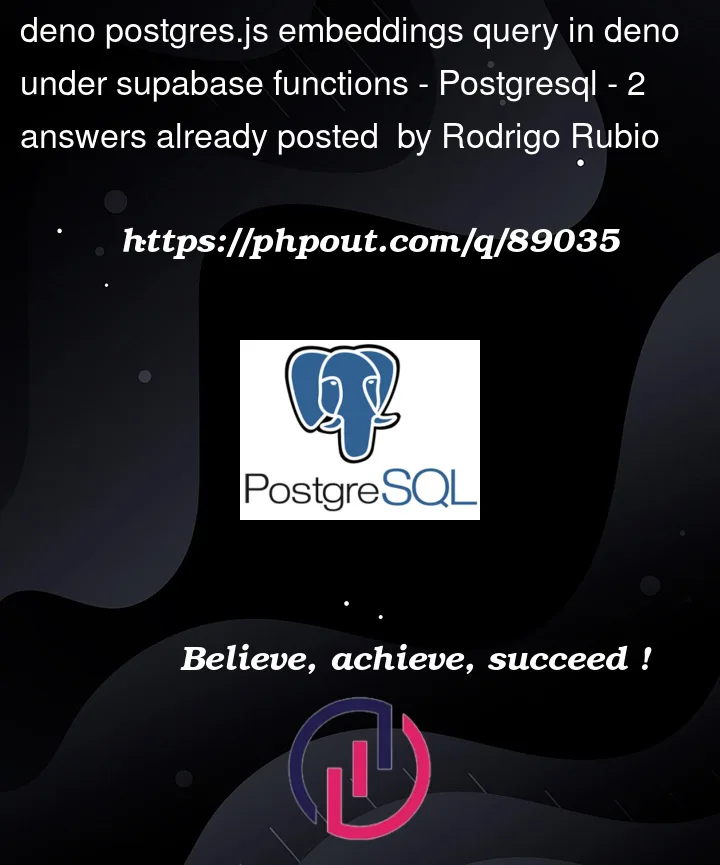Trying to run an embeddings query on data stored from openAI. Currently using Supabase functions, using the following library. Any ideas on how to fix this?
OpenAI Embeddings response is successful –
const [{ embedding }] = embeddingResponse.data.data;
const query_embedding = embedding;
import postgres from 'https://deno.land/x/postgresjs/mod.js'
const res = await sql`
select
id,
content,
1 - (documents.embedding <=> ${query_embedding}) as similarity
from documents
where 1 - (documents.embedding <=> ${query_embedding}) > ${similarity_threshold}
order by documents.embedding <=> ${query_embedding}
limit ${match_count}
`;
On execution, the following error returns. Please note, pg_vector extension has already been enabled an i’m able to save embeddings successfully –
Error... PostgresError: malformed vector literal: "0.0013529072,-0.01248068,-0.021260735,-0.009094394,-0.0059045693,0.04160703,-0.028719138,-0.018231653,-0.005847417,-0.0039685275,0.02343253,0.020260567,-0.0124663925,-0.009144402,-0.013738035,0.028161902,0.02916207,0.00086130627,0.010994715,-0.015588349,0.00782275,-0.0022450222,0.003548814,-0.024804192,-0.009637343,0.008608597,0.015702654,-0.033634257,-0.01856028,-0.027047427,0.032262594,0.006036734,-0.012052037,-0.0009858808,-0.019074652,-0.006551107,0.00666184,0.0058259843,0.021789396,0.020774938,-0.0035988223,0.006126035,0.013023629,0.031205272,-0.011916299,0.014002366,-0.020103397,-0.05046567,-0.0022110878,0.019017499,0.035948932,0.0016172376,0.016074145,0.005100862,0.0026808102,0.017088601,0.0016190236,-0.0064903824,-0.005561654,-0.000671542,0.027804699,0.0044936165,-0.016774263,0.023303937,0.0015582991,0.01573123,0.016902857,-0.008672894,0.0055973744,-0.012752155,0.025447156,0.015245433,-0.010523207,-0.022275193,0.023089616,-0.006783289,-0.042778656,0.00006451983,-0.012730722,0.010273164,-0.004147129,-0.011473367,0.021475058,0.009851664,-0.010101707,-0.0142952725,0.016202739,0.010051698,-0.010808969,-0.00961591,0.022803852,0.026518766,0.006436802,0.009687351,0.0027969012,-0.004782951,-0.026447326,0.018574568,0.002771897,-0.0052651754,-0.0076298607,-0.007937055,-0.006904738,-0.0023039607,-0.022289481,-0.018303093,-0.018688872,0.008122801,0.022546668,-0.021089278,-0.013216519,0.042435743,-0.00572954,-0.02237521,-0.020560617,-0.015102552,-0.00805136,0.0033041297,-0.0024039776,-0.026604496,0.012845027,0.0044936165,0.013016486,-0.033348493,0.008322835,0.015702654,-0.046379264,-0.011787706,-0.018874617,0.0034845173,0.076241456,0.017817296,0.02176082,0.0035005915,-0.0016243816,0.050151333,-0.012930756,-0.0032130429,-0.0128164515,-0.023546835,0.004125697,0.010901842,0.0049186884,0.013273671,-0.01856028,0.015602636,0.040635437,0.0076227165,-0.020274855,-0.014459586,0.009865953,-0.0024986365,0.040121064,-0.019631889,0.0039042311,-0.019674754,-0.046436418,0.0013707674
Schema definition is as following –
create table documents (
id bigserial primary key,
content text,
embedding vector (1536)
);
#supabase #deno #openai #postgresjs




2
Answers
Managed to get it working. See working version below, ended up using "JSON.stringify".
You need
[]around your vector values.